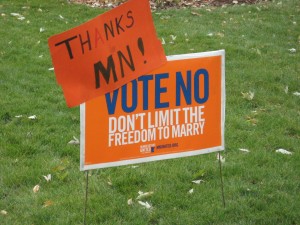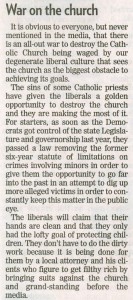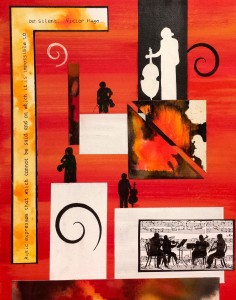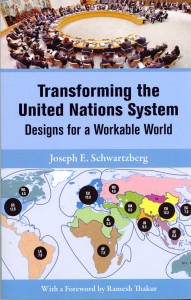#828 – Dick Bernard: Revisiting Dec. 2003, and Albert Camus, 1946.
Brief Personal Thoughts are at the end of this post.
Years ago, a Kansas friend was on my network, and just out of curiosity, to go along with a Christmas letter to her (which I think will probably be returned as an obsolete address), I looked back to see if there was any file folder reference to her name, and indeed there was, as part of a Post 9-11/Iraq War network of over 110 people in December, 2003. The contents of the e-mail she and many others received follows. It is very long, but provides a great deal of food for thought; and ideas for action.
The friend in London who sent it to me is of Syrian Christian background, who’s still on the network, though I haven’t heard from for awhile. Ten years ago Syria was not on the international radar; today it is by no means an abstract proposition….
The essay by Albert Camus which follows, which I inadvertently discovered, seems very pertinent to this time in our history. Read and reflect. It seems to fit the upcoming program of Dr. Joseph Schwartzberg in Minneapolis on Thursday, January 16. I wrote about that upcoming program here. Come if you happen to be in the neighborhood on Thursday.
When Camus wrote his piece, WWII had just ended, and the United Nations was in process of being born. Here’s the essay, apparently in its entirety. The text is exactly as received ten years ago:
Sent December 4, 2003 to 110 people:
This, from SAK, was written shortly after WWII, and is quite long, but is very well worth the time to read and reflect on. Print it out and set it aside. Thank you very much, SAK. (At the end are included some additional comments by SAK, helping bring the piece to 2003.)
Neither Victims nor Executioner’s
Albert Camus, 1946
The Century of Fear
The 17th century was the century of mathematics, the 18th that of the physical sciences, and the 19th that of biology. Our 20th century is the century of fear. I will be told that fear is not a science. But science must be somewhat involved since its latest theoretical advances have brought it to the point of negating itself while it is perfected technology threatens the globe itself with destruction. Moreover, although fear itself cannot be considered a science, it is certainly a technique.
The most striking feature of the world we live in is that most of its inhabitants — with the exception of pietists of various kinds — are cut off from the future. Life has no validity unless it can project itself toward the future, can ripen and progress. Living against the wall is a dog’s life [See Note 1]. True — and the men of my generation, those who are going into the factories and the colleges, have lived and are living more and more like dogs.
This is not the first time, of course, that men have confronted a future materially closed to them. But hitherto they have been able to transcend the dilemma by words, by protests, by appealing to other values which lent them hope. Today no one speaks anymore (except those who repeat themselves because history seems to be in the grip of blind and death forces which will heed neither cries of warning, nor advice, nor entreaties. The years we have gone through have killed something in us. And that something is simply the old confidence man had in himself, which led him to believe that he could always illicit human reactions from another man if he spoke to him in the language of a common humanity. We have seen men lie, degrade, kill, deport, torture — and each time it was not possible to persuade them not to do these things because they were sure of themselves and because one cannot appeal to an abstraction, i.e. , the representative of an ideology [Note 2].
Mankind’s long dialogue has just come to an end. And naturally a man with whom one cannot reason is a man to be feared [Note 3]. The result is that — besides those who have not spoken out because they thought it useless — a vast conspiracy of silence has spread all about us, a conspiracy accepted by those who are frightened and who rationalise their fears in order to hide them from themselves, a conspiracy fostered by those whose interest it is to do so. “You shouldn’t talk about the Russian culture purge — it helps reaction.” “Don’t mention the Anglo — American support of Franco — it encourages Communism.” Fear is certainly a technique.
What with the general fear of the war now being prepared by all nations and the specific fear of murderous ideologies, who can deny that we live in a state of terror? We live in terror because persuasion is no longer possible; because man has been wholly submerged in History; because he can no longer tap that part of his nature, as real as the historical part, which he recaptures in contemplating the beauty of nature and of human faces; because we live in a world of abstractions, of bureaus and machines, of absolute ideas and of crude messianism. We suffocate among people who think they are absolutely right, whether in their machines or in their ideas. And for all who can live only in an atmosphere of human dialogue and sociability, this silence is the end of the world [Note 4].
To emerge from this terror, we must be able to reflect and to act accordingly. But an atmosphere of terror hardly encourages reflection. I believe, however, that instead of simply blaming everything on this fear, we should consider it as one of the basic factors in the situation, and try to do something about it. No task is more important. For it involves the fate of a considerable number of Europeans who, fed up with the lies and violence, deceived in their dearest hopes and repelled by the idea of killing their fellow men in order to convince them, likewise repudiate the idea of themselves being convinced that way. And yet such is the alternative that at present confronts so many of us in Europe who are not of any party — or ill at ease in the party we have chosen — who doubt socialism has been realised in Russia or liberalism in America, who grant to each side the right to affirm its truth but refuse it the right to impose it by murder, individual or collective. Among the powerful of today, these are the men without a kingdom. Their viewpoint will not be recognised (and I say “recognised,” not “triumph”), nor will they recover their kingdom until they come to know precisely what they want and proclaim it directly and boldly enough to make their words a stimulus to action. And if an atmosphere of fear does not encourage accurate thinking, then they must first of all come to terms with fear.
To come to terms, one must understand what fear means: what it implies and what it rejects. It implies and rejects the same fact: a world where murder is legitimate, and were human life is considered trifling [Note 5]. This is the great political question of our times, and before dealing with other issues, one must take a position on it. Before anything can be done, two questions must be put: “do you or do you not, directly or indirectly, want to be killed or assaulted? Do you or do you not, directly or indirectly, want to kill or assault?” All who say No to both these questions are automatically committed to a series of consequences which must modify their way of posing the problem. My aim here is to clarify two or three of these consequences.
Saving our Skins
I once said that, after the experiences of the last two years, I could no longer hold to any truth which might oblige me, directly or indirectly, to demand a man’s life. Certain friends whom I respected retorted that I was living in Utopia, that there was no political truth which could not one day reduce us to such an extremity, and that we must therefore either run the risk of this extremity or else simply put up with the world as it is.
They argued the point most forcefully. But I think they were able to put such force into it only because they were unable to really imagine other people’s death. It is a freak of the times. We make love by telephone, we work not on matter but on machines, and we kill and are killed by proxy. We gain in cleanliness, but lose in understanding.
But the argument has another, indirect meaning: it poses the question of Utopia. People like myself want not a world in which murder no longer exists (we are not so crazy as that!) but rather one in which murder is not legitimate. Here indeed we are Utopian — and contradictory. For we do live, it is true, in a world where murder is legitimate, and we ought to change it if we do not like it. But it appears that we cannot change it without risking murder. Murder thus throws us back on murder, and we will continue to live in terror whether we accept the fact with resignation or wish to abolish it by means which merely replace one terror with another.
It seems to me everyone should think this over. For what strikes me, in the midst of polemics, threats and outbursts of violence, is the fundamental goodwill of everyone. From Right to Left, everyone, with the exception of a few swindlers, believes that his particular truth is the one to make men happy. And yet the combination of all these good intentions has produced the present infernal world, where men are killed, threatened and deported, where war is prepared, where one cannot speak freely without being insulted or betrayed. Thus if people like ourselves live in a state of contradiction, we are not the only ones, and those who accuse us of Utopianism are possibly themselves also living in a Utopia, a different one but perhaps a more costly one in the end.
Let us, then, admit that our refusal to legitimise murder forces us to reconsider our whole idea of Utopia. This much seems clear: Utopia is whatever is in contradiction with reality. From this standpoint, it would be completely Utopian to wish that men should no longer kill each other. That would be absolute Utopia. But a much sounder Utopia is that which insists that murder be no longer legitimised. Indeed, the Marxian and the capitalist ideologies, both based on the idea of progress, both certain that the application of their principles must inevitably bring about a harmonious society, are Utopian to a much greater degree. Furthermore, they are both at the moment costing us dearly [Note 6].
We may therefore conclude, practically, that in the next few years the struggle will be not between the forces of Utopia and the forces of reality, but between different Utopias which are attempting to be born into reality. It will be simply a matter of choosing the least costly among them. I am convinced that we can no longer reasonably hope to save everything, but that we can at least propose to save our skins, so that a future, if not the future remains a possibility.
Thus (1) to refuse to sanction murder is no more Utopian than the “realistic” ideologies of our day, and (2) the whole point is whether these latter are more or less costly. It may, therefore, be useful to try to define, in Utopian terms, the conditions which are needed to bring about the pacification of men and nations. This line of thought, assuming it is carried on without fear and without pretensions, may help to create the preconditions for clear thinking and a provisional agreement between men who want to be neither victims nor executioners. In what follows, they attempt will be not to work out a complete position, but simply too correct some current misconceptions and propose the question of Utopia as accurately as possible. The attempt, in short, will be to define the conditions for a political position that is modest — i.e., free of messianism and disencumbered of nostalgia for an earthly paradise.
The Self-Deception of the Socialists
If we agree that we have lived for ten years in a state of terror and still so live, and that this terror is our chief source of anxiety, then we must see what we can oppose to this terror. Which brings up the question of socialism. For terror is legitimised only if we assent to the principle: “the end justifies the means.” And this principle in turn may be accepted only if the effectiveness of an action is posed as an absolute end, as in nihilistic ideologies (anything goes, success is the only thing worth talking about), or in those philosophies which make History an absolute end (Hegel, followed by Marx: the end being a classless society, everything is good that leads to it).
Such is the problem confronting French Socialists, for example [Note 7]. They are bothered by scruples. Violence and oppression, of which they had hitherto only a theoretical idea, they have now seen at first-hand. And they have had to ask themselves whether, as their philosophy requires, they would consent to use that violence themselves, even as a temporary expedient and for a quite different end. The author of a recent preface to Saint–Just, speaking of men of an earlier age who had similar scruples, wrote contemptuously: “They recoiled in the face of horrors.” True enough. And so they deserved to be despised by strong, superior spirits who could live among horrors without flinching. But all the same, they gave a voice to the agonised appeal of commonplace spirits like ourselves, the millions who constitute the raw material of History and who must someday be taken into account, despite all contempt.
A more important task, I think, is to try to understand the state of contradiction and confusion in which our Socialists now exist. We have not thought enough about the moral crisis of French Socialism, as expressed, for example in a recent party congress. It is clear that our Socialists, under the influence of Leon Blum and even more under the pressure of events, have preoccupied themselves much more with moral questions (the end does not justify all means) than in the past. Quite properly, they wanted to base themselves on principles which rise superior to murder. It is also clear that these same Socialists want to preserve Marxian doctrine, some because they think one cannot be revolutionary without being Marxist, others, by fidelity to party tradition, which tells them that one cannot be socialist without being Marxist. The chief task of the last party congress was to reconcile the the desire for a morality superior to murder with the determination to remain faithful to Marxism. But one cannot reconcile what is irreconcilable.
For if it is clear that Marxism is true and there is logic in History, then political realism is legitimate. It is equally clear that if the moral values extolled by the Socialist Party are legitimate, then Marxism is absolutely false sense it claims to be absolutely true. From this point of view, the famous “going beyond” Marxism in an idealistic and humanitarian direction is a joke and an idle dream. It is impossible to “go beyond” Marx, for he himself carried his thought to its extreme logical consequences. The Communists have a solid logical basis for using the lies and the violence which the Socialists reject, and the basis is that very dialectic which the Socialists want to preserve. It is therefore hardly surprising that the Socialist congress ended by simply putting forward simultaneously two contradictory positions — a conclusion whose sterility appears in the results of the recent elections.
This way, confusion will never end. A choice was necessary, and the Socialists would not or could not choose.
I have chosen this example not to score off the Socialists but to illustrate the paradoxes among which we live. To score off the Socialists, one would have to be superior to them. This is not yet the case. On the contrary, I think this contradiction is common to all those of whom I speak, those who want a society which we can both enjoy and respect; those who want men to be both free and just, but who hesitate between a freedom in which they know justice is finally betrayed and a justice in which they see freedom suppressed from the first. Those who know What Is To Be Done or What Is To Be Thought make fun of this intolerable anguish. But I think it would be better, instead of jeering at it, to try to understand and clarify this anguish, see what it means, interpret its quasi-total rejection of a world which provokes it, and trace out the feeble hope that suffuses it.
A hope that is grounded precisely in this contradiction, since it forces — or will force — the Socialists to make a choice. They will either admit that the end justifies the means, in which case murder can be legitimised; or else, they will reject Marxism as an absolute philosophy, confining themselves to its critical aspect, which is often valuable. If they choose the first, their moral crisis would be ended, and their position will be unambiguous. If the second, they will exemplify the way our period marks the end of ideologies, that is, of absolute Utopias which destroy themselves, in History, by the price they ultimately exact. It will then be necessary to choose a most modest and less costly Utopia. At least it is in these terms that the refusal to legitimise murder forces us to pose the problem.
Yes, that is the question we must put, and no one, I think, will venture to answer it likely.
Parody of Revolution
Since August, 1944, everybody talks about revolution, and quite sincerely too. But sincerity is not in itself a virtue: some kinds are so confused that they are worse than lies. Not the language of the heart but merely that of clear thinking is what we need today. Ideally, a revolution is a change in political and economic institutions in order to introduce more freedom and justice; practically, it is a complex of historical events, often undesirable ones, which brings about the happy transformation.
Can one say that we use this word today in its classical sense? When people nowadays hear the word, “revolution,” they think of a change in property relations (generally collectivisation) which may be brought about either by majority legislation or by a minority coup.
This concept obviously lacks meaning in present historical circumstances. For one thing, the violent seizure of power is a romantic idea which the perfection of armaments has made illusory. Since the repressive apparatus of a modern State commands tanks and airplanes, tanks and airplanes are needed to counter it. 1789 and 1917 are still historic dates, but they are no longer historic examples.
And even assuming this conquest of power were possible, by violence or by law, it would be effective only if France (or Italy or Czechoslovakia) could be put into parantheses and isolated from the rest of the world. For, in the actual historical situation of 1946, a change in our old property system would involve, to give only one example, such consequences to our American credits that our economy would be threatened with ruin. A right-wing coup would be no more successful, because of Russia with her millions of French Communist voters and her position as the dominant continental power. The truth is — excuse me for stating openly what everyone knows and no one says — the truth is that we French are not free to make a revolution. Or at least that we can be no longer revolutionary all by ourselves, since there no longer exists any policy, conservative or socialist, which can operate exclusively within a national framework.
Thus we can only speak of world revolution. The revolution will be made on a world scale or it will not be made at all. But what meaning does this expression still retain? There was a time when it was thought that international reform would be brought about by the conjunction or the synchronisation of a number of national revolutions — a kind of totting — up of miracles. But today one can conceive only the extension of a revolution that has already succeeded. This is something Stalin has very well understood, and it is the kindest explanation of his policies (the other being to refuse Russia the right to speak in the name of revolution).
This viewpoint boils down to conceiving of Europe and the West as a single nation in which a powerful and well — armed minority is struggling to take power. But if the conservative forces — in this case, the USA — are equally well armed, clearly the idea of revolution is replaced by that of ideological warfare. More precisely, world revolution today involves a very great danger of war. Every future revolution will be a foreign revolution. It will begin with a military occupation — or, what comes to the same thing, the blackmail threat of one. And it will become significant only when the occupying power has conquered the rest of the world [Note 8].
Inside national boundaries, revolutions have already been costly enough — a cost that has been accepted because of the progress they are assumed to bring. Today the cost of a world war must be weighed against the progress that may be hoped for from either Russia or America gaining world power. And I think it of first importance that such a balance be struck, and that for once we use a little imagination about what this globe, where already 30 million fresh corpses lie, will be like after it cataclysm which will cost us ten times as many.
Note that this is a truly objected approach, taking account only of reality without bringing in ideological or sentimental considerations. It should give pause to those who talk lightly of revolution. The present-day content of this word must be accepted or rejected as a whole. If it be accepted, then one must recognise a conscious responsibility for the coming war. If rejected, then one must either come out for the status quo — which is a mood of absolute Utopia in so far as it assumes the “freezing” of history — or else give a new content to the word “revolution,” which means assenting to what might be called relative Utopia. Those who want to change the world must, it seems to me, now choose between the charnel-house threatened by the impossible dream of history suddenly struck motionless, and the acceptance of a relative Utopia which gives some leeway to action and to mankind. Relative Utopia is the only realistic choice; it is our last frail hope of saving our skins.
International Democracy and Dictatorship
We know today that there are no more islands, that frontiers are just lines on a map. We know that in a steadily accelerating world, were the Atlantic is crossed in less than a day and Moscow speaks to Washington in a few minutes, we are forced into fraternity — or complicity. The forties have taught us that an injury done a student in Prague strikes down simultaneously a worker in Clichy, that blood shed on the banks of a Central European river brings a Texas farmer to spill his own blood in the Ardennes, which he sees for the first time. There is no suffering, no torture anywhere in the world which does not affect our everyday lives.
Many Americans would like to go on living closed off in their own society, which they find good. Many Russians perhaps would like to carry on their Statist experiment holding aloof from the capitalist world. They cannot do so, nor will they ever again be able to do so. Likewise, no economic problem, however minor it appears, can be solved outside the comity of nations. Europe’s bread is in Buenos Aires, Siberian machine-tools are made in Detroit. Today, tragedy is collective.
We know, then, without shadow of a doubt, that the new order we seek cannot be merely national, or even continental; certainly not occidental nor oriental. It must be universal. No longer can we hope for anything from partial solutions or concessions. We are living in a state of compromise, i.e., anguish today and murder tomorrow. And all the while the pace of history and the world is accelerating. The 21 deaf men, the war criminals of tomorrow, who today negotiate the peace carry on their monotonous conversations placidly seated in an express-train which bears them toward the abyss at a 1000 miles an hour.
What are the methods by which this world unity may be achieved, this international revolution realised in which the resources of men, of raw materials, of commercial markets and cultural riches may be better distributed? I see only two and these two between them define our ultimate alternative.
The world can be united from above, by a single State more powerful than the others. The USSR or the USA could do it. I have nothing to say to the claim that they could rule and remodel the world in the image of their own society. As a Frenchman, and still more as a Mediterranean, I find the idea repellent. But I do not insist on this sentimental argument. My only objection is, as stated in the last election, that this unification could not be accomplished without war — or at least without serious risk of war. I will even grant what I do not believe: that it would not be an atomic war. The fact remains, nevertheless, that the coming war will leave humanity so mutilated and impoverished that the very idea of law and order will become an anachronistic. Marx could justify, as he did, the war of 1870, for it was a provincial war fought with Chassepot rifles. In the Marxian perspective, a 100,000 corpses are nothing if they are the price of the happiness of hundreds of millions of men [Note 9]. But the sure death of millions of men for the hypothetical happiness of the survivors seems too high a price to pay. The dizzy rate at which weapons have evolved, a historical fact ignored by Marx, forces us to raise anew the whole question of means and ends. And in this instance, the means can leave us little doubt about the end. Whatever the desired end, however lofty and necessary, whether happiness or justice or liberty — the means employed to attain it represent so enormous a risk and are so disproportionate to the slender hopes of success, that, in all sober objectivity, we must refuse to run this risk.
This leaves us only the alternative method of achieving a world order: the mutual agreement of all parties. This agreement has a name: international democracy. Of course everyone talks about the U.N. but what is international democracy? It is a democracy which is international. (The truism will perhaps be excused, since the most self-evident truths are also the ones most frequently distorted.) International — or national — democracy is a form of society in which law has authority over those governed, law being the expression of the common will as expressed in a legislative body. An international legal code is indeed now being prepared. But this code is made and broken by governments, that is by the executive power. We are thus faced with a regime of international dictatorship. The only way of extricating ourselves is to create a world parliament through elections in which all peoples will participate, which will enact legislation which will exercise authority over national governments. Since we do not have such a parliament, all we can do now is to resist international dictatorship; to resist on a world scale; and to resist by means which are not in contradiction with the end we seek.
The World Speeds Up
As everyone knows, political thought today lags more and more behind events. Thus the French fought the 1914 war with 1870 methods, and the 1939 war with 1918 methods. Antiquated thinking is not, however, a French specialty. We need only recall that the future of the world is being shaped by liberal-capitalist principles, developed in the 18th century and by “scientific socialist” principles developed in the 19th. Systems of thought which, in the former case, date from the early years of modern industrialism, and in the latter, from the age of Darwinism and of Renanian optimism, now propose to master the age of the atomic bomb, of sudden mutations, and of nihilism.
It is true that consciousness is always lagging behind reality: History rushes onward while thought reflects. But this inevitable backwardness becomes more pronounced the faster History speeds up. The world has changed more in the past 50 years than it did in the previous 200 years thus we see nations quarrelling over frontiers when everyone knows that today frontiers are mere abstractions. Nationalism was, to all appearances, the dominant note at the Conference of the 21.
Today we concentrate our political thinking on the German problem, which is a secondary problem compared to the clash of empires which threatens us. But if tomorrow we resolve the Russo-American conflict we may see ourselves once more outdistanced. Already the clash of empires is in process of becoming secondary to the clash of civilizations [Note 10]. Everywhere the colonial peoples are asserting themselves. Perhaps in ten years, perhaps in 50, the dominance of Western civilisation itself will be called into question. We might as well recognise this now, and admit these civilisations into the world parliament, so that its code of law may become truly universal, and a universal order be established.
The veto issue in the U.N. today is a false issue because the conflicting majorities and minorities are false. The USSR will always have the right to reject majority rule so long as it is a majority of ministers and not a majority of peoples, all peoples, represented by their delegates. Once such a majority comes into being, then each nation must obey it or else reject its law — that is, openly proclaim its will to dominate… [Note 11]
To reply once more and finally to the accusation of Utopia: for us, the choice is simple, Utopia or the war now being prepared by antiquated modes of thought. … Sceptical though we are (and as I am), realism forces us to this Utopian alternative. When our Utopia has become part of history, as with many others of like kind, men will find themselves unable to conceive reality without it. For History is simply man’s desperate effort to give body to his most clairvoyant dreams.
A New Social Contract
All contemporary political thinking which refuses to justify lies and murder is led to the following conclusions: (1) domestic policy is in itself a secondary matter; (2) the only problem is the creation of a world order which will bring about those lasting reforms which are the distinguishing mark of a revolution; (3) within any given nation there exist now only administrative problems, to be solved provisionally after a fashion, until a solution is worked out which will be more effective because more general.
For example, the French Constitution can only be evaluated in terms of the support it gives or fails to give to a world order based on justice and the free exchange of ideas. From this viewpoint, we must criticise the indifference of our Constitution to the simplest human liberties. And we must also recognise that the problem of restoring the food supply is ten times more important than such issues as nationalisation or election figures. Nationalisation will not work in a single country. And although the food supply cannot be assured either within a single country, it is a more pressing problem and calls for expedients, provisional though they may be.
And so this viewpoint gives us a hitherto lacking criterion by which to judge domestic policy. 30 editorials in Aube may range themselves every month against 30 in Humanité, but they will not cause us to forget that both newspapers, together with the parties they represent, have acquiesced in the annexation without a referendum of Briga and Tenda, and that they are thus accomplices in the destruction of international democracy. Regardless of their good or bad intentions, Mr. Bidault and Mr. Thorez are both in favour of international dictatorship. From this aspect, whatever other opinion one may have of them, they represent in our politics not realism but the most disastrous kind of Utopianism.
Yes, we must minimise domestic politics. A crisis which tears the whole world apart must be met on a world scale. A social system for everybody which will somewhat allay each one’s misery and fear is today our logical objective. But that calls for action and for sacrifices, that is, for men. And if there are many today who, in their secret hearts, detest violence and killing, there are not many who care to recognise that this forces them to reconsider their actions and thoughts. Those who want to make such an effort, however, will find in such a social system a rational hope and a guide to action.
They will admit that little is to be expected from present-day governments, since these live and act according to a murderous code. Hope remains only in the most difficult task of all: to reconsider everything from the ground up, so as to shape a living society inside a dying society. Men must therefore, as individuals, draw up among themselves, within frontiers and across them, a new social contract which will unite them according to more reasonable principles.
The peace movement I speak of could base itself, inside nations, on work-communities and, internationally, on intellectual communities; the former, organised cooperatively, would help as many individuals as possible to solve their material problems, while the latter would try to define the values by which this international community would live, and would also plead its cause on every occasion.
More precisely, the latter’s task would be to speak out clearly against the confusions of the Terror and at the same time to define the values by which a peaceful world may live. The first objectives might be the drawing up of an international code of justice whose Article No. 1 would be the abolition of the death penalty, and an exposition of the basic principles of a sociable culture (“civilisation du dialogue”). Such an undertaking would answer the needs of an era which has found no philosophical justification for that thirst for fraternity which today burns in Western man. There is no idea, naturally, of constructing a new ideology, but rather of discovering a style of life.
Let us suppose that certain individuals resolve that they will consistently oppose to power the force of example; to authority, exhortation; to insult, friendly reasoning; to trickery, simple honour. Let us suppose they refuse all the advantages of present-day society and accept only the duties and obligations which bind them to other men. Let us suppose they devote themselves to orienting education, the press and public opinion toward the principles outlined here. Then I say that such men would be acting not as Utopians but as honest realists Note 12]. They would be preparing the future and at the same time knocking down a few of the walls which imprisoned us today. If realism be the art of taking into account both the present and future, of gaining the most while sacrificing the least, then who can fail to see the positively dazzling realism of such behaviour?
Whether these men will arise or not I do not know it is probable that most of them are even now thinking things over, and that is good. But one thing is sure: their efforts will be effective only to the degree they have the courage to give up, for the present, some of their dreams, so as to grasp the more firmly the essential point on which our very lives depend. Once there, it will perhaps turn out to be necessary, before they are done, to raise their voices.
Towards Sociability
Yes, we must raise our voices. Up to this point, I have refrained from appealing to emotion. We are being torn apart by a logic of History which we have elaborated in every detail — a net which threatens to strangle us. It is not emotion which can cut through the web of a logic which has gone to irrational lengths, but only reason which can meet logic on its own ground. But I should not want to leave the impression in concluding, that any program for the future can get along without our powers of love and indignation. I am well aware that it takes a powerful prime mover to get men into motion and that it is hard to throw one’s self into a struggle whose objectives are so modest and where hope has only a rational basis — and hardly even that. But the problem is not how to carry men away; it is essential, on the contrary, that they not be carried away but rather that they be made to understand clearly what they are doing.
To save what can be saved so as to open up some kind of future — that is the prime mover, the passion and the sacrifice that is required. It demands only that we reflect and then decide, clearly, whether humanity’s lot must be made still more miserable in order to achieve far-off and shadowy ends, whether we should accept a world bristling with arms where brother kills brother; or whether, on the contrary we should avoid bloodshed and misery as much as possible so that we give a chance for survival to later generations better equipped than we are.
For my part, I am fairly sure that I have made the choice. And, having chosen, I think that I must speak out, that I must state that I will never again be one of those, whoever they be, who compromise with murder, and that I must take the consequences of such a decision. The thing is done, and that is as far as I can go at present. Before concluding, however, I want to make clear the spirit in which this article is written.
We are asked to love or to hate such and such a country and such and such a people. But some of us feel too strongly our common humanity to make such a choice. Those who really love the Russian people, in gratitude for what they have never ceased to be — that world leaven which Tolstoy and Gorky speak of — do not wish for them success in power-politics, but rather want to spare them, after the ordeals of the past, a new and even more terrible bloodletting. So, too, with the American people, and with the peoples of unhappy Europe. This is the kind of elementary truth we are liable to forget amidst the furious passions of our time.
Yes, it is fear and silence and the spiritual isolation they cause that must be fought today. And it is sociability (“le dialogue”) and the universal intercommunication of men that must be defended. Slavery, injustice and lies destroy this intercourse and forbid this sociability; and so we must reject them. But these evils are today the very stuff of History, so that many consider them necessary evils. It is true that we cannot “escape History,” since we are in it up to our necks. But one may propose to fight within History to preserve from History that part of man which is not its proper province. That is all I have tried to say here. The “point” of this article may be summed up as follows:
Modern nations are driven by powerful forces along the roads of power and domination. I would not say that these forces should be furthered or that they should be obstructed. They hardly need our help and, for the moment, they laugh at attempts to hinder them. They will, then, continue. But I will ask only this simple question: what if these forces wind up in a dead end, what if that logic of history on which so many now rely turns out to be a will o’ the wisp? What if, despite two or three world wars, despite the sacrifice of several generations and a whole system of values, our grandchildren — supposing they survive — find themselves no closer to a world society? It may well be that the survivors of such an experience would be too weak to understand their own sufferings. Since these forces are working themselves out and since it is inevitable that they continue to do so, there is no reason why some of us should not take on the job of keeping alive, through the apocalyptic historical vista that stretches before us, a modest thoughtfulness which, without pretending to solve everything, will constantly be prepared to give some human meaning to everyday life. The essential thing is that people should carefully weigh the price they must pay.
To conclude: all I ask is that, in the midst of a murderous world, we agree to reflect on murder and to make a choice. After that, we can distinguish those who accept the consequences of being murderous themselves or the accomplices of murderers, and those who refuse to do so with all their force and being. Since this terrible dividing line does actually exist, it will be a gain if it be clearly marked. Over the expanse of five continents throughout the coming years an endless struggle is going to be pursued between violence and friendly persuasion, a struggle in which, granted, the former has 1000 times the chances of success than that of the latter. But I have always held that, if he who bases his hopes on human nature is a fool, he who gives up in the face of circumstances is a coward. And henceforth, the only honourable course will be to stake everything on a formidable gamble: that words are more powerful than munitions.
Notes from SAK:
(1) An 8-meter wall is indeed being built by Israel when Robert Frost (Mending Wall) asserts “Something there is that doesn’t love a wall”
He only says, “Good fences make good neighbors.”
Spring is the mischief in me, and I wonder
If I could put a notion in his head:
“Why do they make good neighbors? Isn’t it
Where there are cows? But here there are no cows.
Before I built a wall I’d ask to know
What I was walling in or walling out,
And to whom I was like to give offence.
Something there is that doesn’t love a wall,
(2) In the present age even democracies can be hijacked by ideologies …
(3) Osama B. Laden, G. W. Bush … The majority of those polled in Europe now believe the US is currently the greatest threat to world peace.
(4) Many thanks for a forum that make dialogue & sociability possible still. The advice to messianic leaders is therefore to get out more … and see not only “the beauty of nature and of human faces” but also the results of their actions on “people”.
(5) Michael Moore has single-handedly brought the catastrophic effects of fear to light.
(6) The capitalist ideology magnified by globalisation might indeed be causing the more damage currently if only because the Marxist ideology is no longer being tried!
(7) Although interesting historically this section is no longer very relevant to French politics.
(8) Hence the growing resistance to a unipolar world – it takes great intelligence for a single super power to resist the temptations of world domination.
(9) Europe lost more during the 10 years of world wars I & II on a daily basis (on average) than the US suffered in the World Trade Center attack. This might explain why Le Monde’s headline on Sept. 12th was “We Are All Americans” but the solidarity seemed to dissolve when the US reaction became aggressively evident and Europe suddenly turned wimpishly pacifist.
(10) The “clash of civilizations” in so many words and in 1946! That should give credence to Camus’ whole thesis. This is a matter of life or death indeed.
(11) So has the Bush administration come out? “Once such a majority comes into being, then each nation must obey it or else reject its law — that is, openly proclaim its will to dominate.”
(12) All those working for Peace & Justice are the realists, not the utopians.
Dick Bernard, Jan 14, 2014, thoughts after reading Camus and the end notes from SAK
1. Every ideology has its hierarchy, and as it begins to reach its seeming goal, all goes awry. So, the radical extremes of socialism in the twentieth century were National Socialism (Nazis) in Germany, and Communism in the Soviet Union. The closer on came to utopian ideals the greater the disaster. So, I believe, it can be said for those who strive for the perfection of any ‘ism’, the ascendance of money, freedom, unfettered capitalism, some religious dogma or other. Any and all of these have charismatic leaders who if unchecked ultimately bring disaster to their subjects.
2. Those “married” to their own favorite ideology will deny #1.
3. Camus, I would argue, was attempting to talk some sense into rigid idealists, ideologues, who would if given free rein simply replace one ideology with another which in the end, if their goal was realized, would be equally disastrous.
4. Currently, unfettered Capitalism and Money dominates the American conversation. Money is Power. We are sowing the seeds of our own destruction by the ever-increasing gap between have and have not; but…
5. …it is easier to complain and aspire to an unreachable ideal, than to work for incremental and slow change, which requires compromise.
6. It is possible, perhaps probable, that it is the nature of humans to procrastinate on everything, including waiting for a disaster to happen before attending to the causes that created the disaster in the first place. If this be true, we are probably “toast”, since we possess the capability of essentially destroying what we know as “civilization” in the next war, simply using the technology that we now possess.
I hope that this is not the case.










